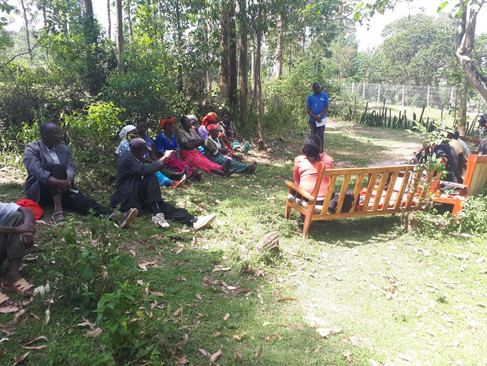'Our Planet, Our Health'
Updated: Oct 6, 2022
We are joining the global celebrations for World Health Day on 7th April by looking at recent developments in Kenya through our Spring Protection work with local communities.
In 2021, we did a lot of work asking households in Bomet County how they got their water, and we mapped 200 community water points. One of the biggest results we found was how often people used springs. Bomet County is in the Great Rift Valley, and the high rainfall we have in Bomet means that there are lots of springs originating from the highlands where farming communities are. As a result, just over one-third of the residents relied on spring water to drink, but the vast majority of these springs haven't been protected. This means that there are thousands of people currently being exposed to harmful pathogens, which can lead to people catching preventable waterborne diseases such as typhoid and cholera.
Protecting a spring is a really simple and sustainable process. We construct a spring box to capture and store the clean water gushing out from the spring, we can make the source more reliable, and protect it from contamination: a double win. As these springs can be very easily protected, Dig Deep will be prioritising the construction of spring protection schemes from this year. We've already protected one such spring in Chemutial which was recently opened on World Water Day and celebrated in the Kenyan national press.
Images taken at the commissioning of Chemutial Spring on World Water Day 2022
But there's also a long history of springs being protected in this region, only to fall into disrepair and end up being useless. It's no help to capture spring water if there are cracks in the spring box, and animal droppings can be washed in: in some ways, this is worse than doing nothing, as it can be false confidence in the safety of a source so people are less likely to boil water or use other preventative measures. That's why we're doing things a bit differently.
We are closely partnered with Bomet County Department of Water so that there's a guarantee that the schemes we develop are handed over to the proper authorities, and have an ongoing plan for maintenance. We're also working within the communities we operate in to establish water committees to do the everyday maintenance of the spring site, and to report to the department of water if there is a need for more onerous repairs.
Images right to left. Community members collecting water from Chemutial Spring and participation meetings with community members
There aren't any silver bullets to building resilient water supplies. What's needed is hard work, collaboration with lots of different partners, and an appreciation that the longevity of projects like our spring protection schemes relies on the systems behind those schemes functioning, being properly financed and filled with skilled professionals. It's not quite as sexy as the traditional narrative you normally hear about clean water provision, but those systems are the invisible threads that will ensure ten years from now people in Bomet won’t be catching cholera from drinking water.
Written by Joe Hook, Progammes Officer. If you have any questions for Joe, feel free to reach out to us support@digdeep.org.uk.












